What’s the AUKUS nuclear submarine deal between US, UK, and Australia? Why is China upset?
What’s the AUKUS nuclear submarine deal between US, UK, and Australia? Why is China upset?
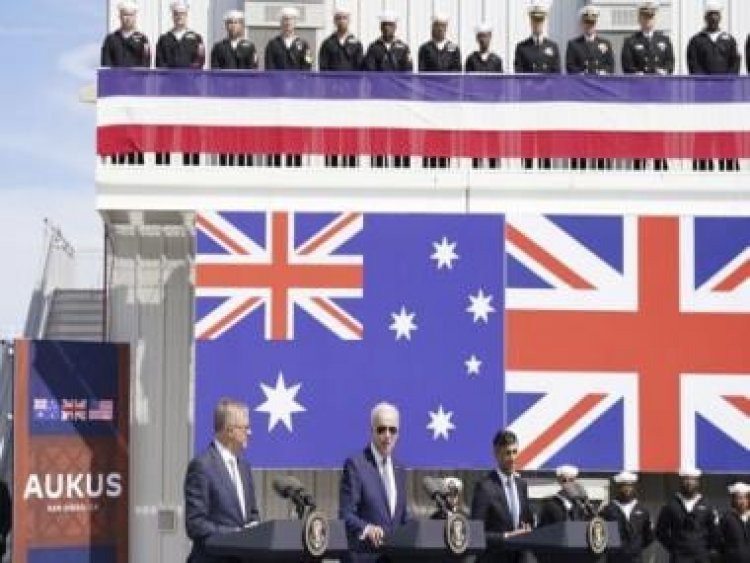
Australia is all set to get its own nuclear-powered submarine. The plan was finalised after a year and a half of negotiations with the United States and the United Kingdom.
Under the defence deal, America and Britain will help Australia deploy nuclear-powered submarines in the Pacific region. This programme – one of the most significant military tasks embarked on by Australia in a century – will help the country acquire and build its own n-vessels.
The AUKUS agreement, as it is called, is expected to cost the Land Down Under anywhere between $268 billion to $368 billion between now and the mid-2050s, according to a report by The Guardian. It will be decades until the submarines are in the water but the programme will have geopolitical consequences.
We take a look at what this deal is and why it is significant.
What is AUKUS?
The defence deal called AUKUS was agreed upon by Australia, UK and the US in September 2021. The first aspect of the pact is equipping Australia with submarines and this part of the agreement is called Pillar One. The US and UK will share plans for their submarines that will help Australia build its own eventually.
The AUKUS agreement is aimed a preserving a “free and open” Indo-Pacific.
Before the pact, Australia planned to buy diesel-powered subs from France in a $60 billion deal in 2016. But Canberra abruptly scrapped it and joined AUKUS, leading to diplomatic tensions with Paris, which have subsided after the election of Anthony Albanese.
On Monday, Australia’s prime minister said that the Aukus plan marked “a new chapter” in the relationship between the three countries. He joined US president Joe Biden and his British counterpart Rishi Sunak for the announcement in San Diego.
I stood alongside Prime Minister Albanese of Australia and Prime Minister Sunak of the United Kingdom to announce how we will move the Australia-United Kingdom-United States partnership forward.
Together we will advance peace and security in the Indo-Pacific for years to come. pic.twitter.com/m24s1ztdPB
— President Biden (@POTUS) March 13, 2023
What do we know of the submarine deal?
The three nations will create a new fleet of cutting-edge tech which include Rolls-Royce reactors made in the UK. Under the deal, members of the Royal Australian Navy will be trained to use the subs and will be embedded at submarine bases in the US and the UK from this year, reports BBC.
The country will receive at least three nuclear-powered submarines from the US in the early 2030s. These Virginia-class vessels will be second-hand and need the approval of the US Congress. Australia will have the option to purchase two more. These have an estimated value of $3 billion each.
Compared with the Collins-class submarines due to be retired by Australia, the Virginia-class is almost twice as long and carries nearly three times more crew, with a capacity for 132 on board. The US vessels are also able to stay submerged almost indefinitely and launch powerful cruise missiles, according to a report by Al Jazeera.
From 2027, the US and the UK will base some vessels at Perth’s Ran Base.
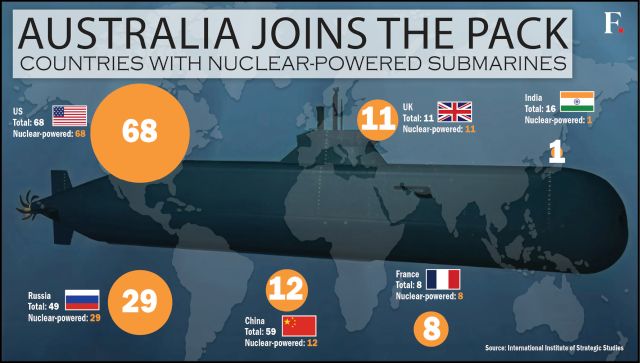
Australia will get up to eight new submarines called SSN-AUKUS. They will have British designs and will be powered by the American combat system, according to a report by ABC Australia. These attack crafts will be built in Britain and Australia.
The UK is expected to get deliver the first home-built sub by the late 2030s. Australia will deliver new vessels to its navy by the early 2040s.
These boats will be faster than Australia’s existing fleet. They will come with cruise missiles that have the capability of striking targets on land and at sea, reports the BBC.
With the deal, Australia will join a group of seven countries which have such ships: the US, Russia, China, the UK, France and India.
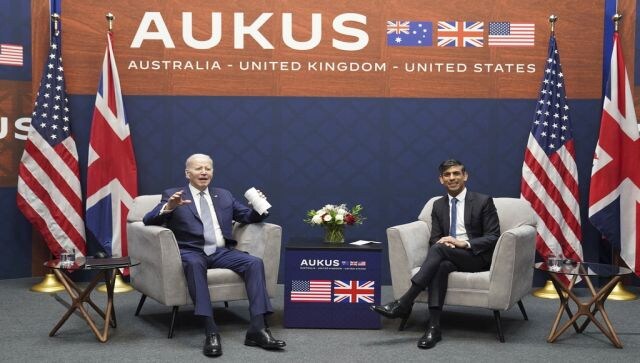
What are the leaders of the three nations saying?
Speaking at the Naval Base Point in San Diego, Joe Biden said that the moment was “an inflection point in history, where the hard work of enhancing deterrence and promoting stability is going to affect the prospect of peace for decades to come”.
Australia’s Albanese said that the submarine deal marked the “biggest single investment in Australia's defence capability in all of its history”. According to him, this is the first time in 65 years and the second time in history that the US has shared its nuclear propulsion technology.
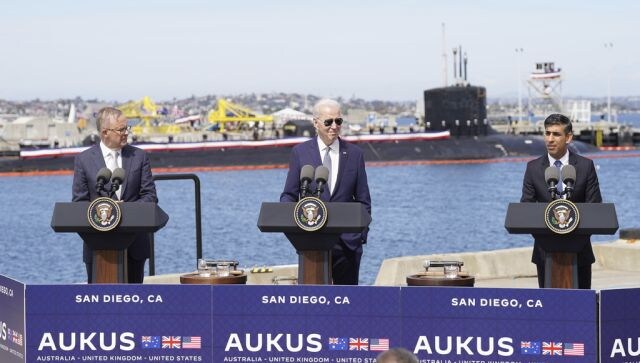
Talking about new security challenges like Russia’s “illegal invasion” of Ukraine, “China’a growing assertiveness” and “destabilising behaviour of Iran and North Korea”, Sunak said, “Faced with this new reality, it is more important than ever, that we strengthen the resilience of our own countries.”
“But ultimately, the defence of our values depends, as it always has, on the quality of our relationships with others,” he added.
Also read: AUKUS has opened strategic opportunity for India, and France is a key player in the equation
What threats does Australia face?
The AUKUS pact is seen as an answer to counter China’s growing military presence in the Asia Pacific region.
Albanese has described the deal as the “single biggest leap” in the history of Australia’s nuclear capabilities. The submarines will give the Australian navy the capability to reach far out in the ocean and launch attacks.
Australia currently has diesel-powered submarines, which can also carry nuclear warheads. However, these ships need to frequently resurface over water, making them easier to detect. They are smaller, cheaper and easier to maintain but advancements in tech have made them obsolete.
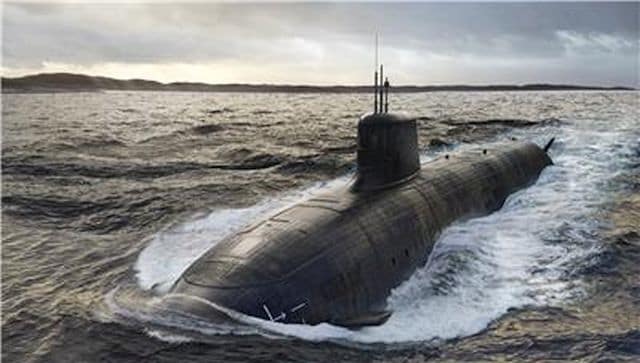
“Australia’s submarines face long transits between ports, let alone to potential distant hot spots. Advances in artificial intelligence and persistent surveillance make detection easier to the point where a short “snort” to recharge batteries is detectable. To lose stealth is to lose the key advantage of submarines, so something had to give,” John Blaxland, professor at the Strategic and Defence Studies Centre, Australian National University, wrote in The Conversation.
Nuclear subs make for better stealth weapons as they can remain submerged underwater for years, making them difficult to detect. They don’t need to refuel like the diesel vessels as steam using a nuclear reactor onboard is used to turn the turbines, according to an Al Jazeera report.
While the vessels will be nuclear-powered, Australia has said that it does not necessarily mean they will carry nukes. The three allies have said that the plans are consistent with international non-proliferation rules, despite protests from China.
The deal is a clear message to Beijing. The US and its allies view China’s burgeoning naval ambitions as a top threat to their security and are preparing for a long-term struggle, says an article in CNN.
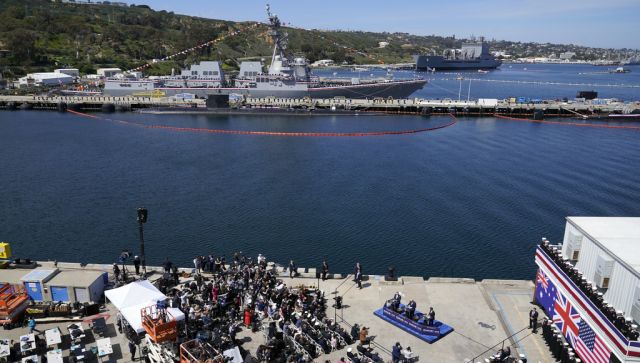
How has China reacted?
Beijing has long criticised the deal, calling it a “dangerous” provocation in the past. It has repeatedly accused Australia, the UK, and the US of adopting a “Cold War mentality” that risks a greater escalation in the region.
After the AUKUS deal was announced, China’s mission to the UN said that it is a “blatant act that constitutes serious nuclear proliferation risks, undermines international non-proliferation system, fuels arms races, and hurts peace and stability in the region”.
The nuclear submarine cooperation plan released today by #AUKUS is a blatant act that constitutes serious nuclear proliferation risks, undermines international non-proliferation system, fuels arms races, and hurts peace and stability in the region.
— Chinese Mission to UN (@Chinamission2un) March 13, 2023
“The irony of #AUKUS is that two nuclear weapons states who claim to uphold the highest nuclear non-proliferation standard are transferring tons of weapons-grade enriched uranium to a non-nuclear-weapon state, clearly violating the object and purpose of the NPT,” it added.
With inputs from agencies
Read all the Latest News, Trending News, Cricket News, Bollywood News,
India News and Entertainment News here. Follow us on Facebook, Twitter and Instagram.
What's Your Reaction?



























































